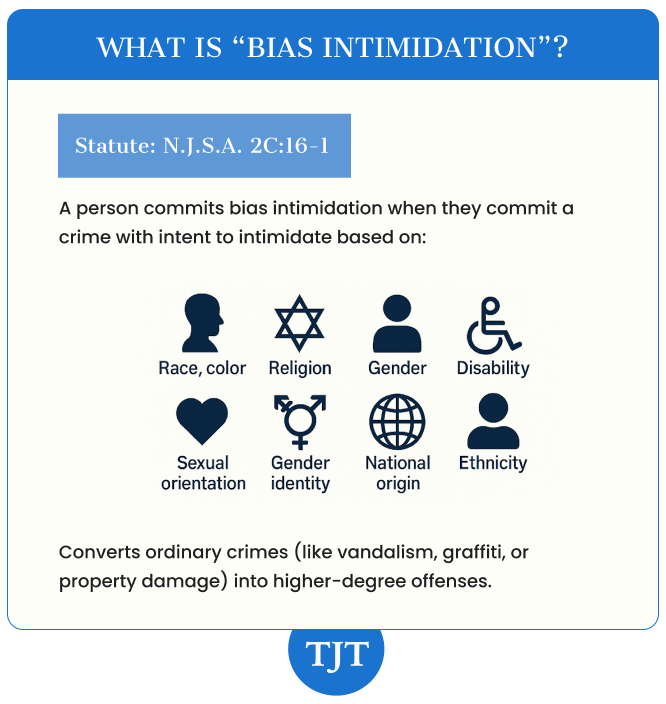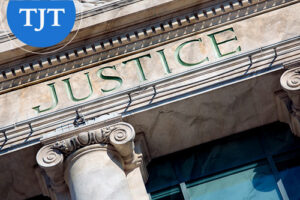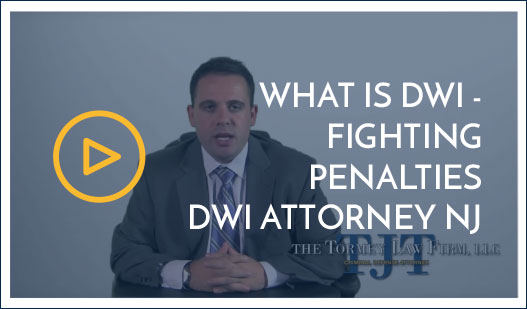Israeli Flag Burned at Tenafly Synagogue: Legal Consequences Explained
 Tenafly police recently reported that an Israeli flag was set ablaze in front of the synagogue in Tenafly. The act was swiftly denounced by state and community leaders, who described it as a disturbing display of antisemitism. These kinds of crimes are taken seriously and can carry hate crime charges with elevated penalties. Crimes such as vandalism, graffiti, and property damage can also be combined with criminal mischief, and with supplemental evidence of bias, the potential sentences are substantially increased.
Tenafly police recently reported that an Israeli flag was set ablaze in front of the synagogue in Tenafly. The act was swiftly denounced by state and community leaders, who described it as a disturbing display of antisemitism. These kinds of crimes are taken seriously and can carry hate crime charges with elevated penalties. Crimes such as vandalism, graffiti, and property damage can also be combined with criminal mischief, and with supplemental evidence of bias, the potential sentences are substantially increased.
How NJ Law Defines Bias Intimidation (N.J.S.A. 2C:16-1)
Under N.J.S.A. 2C:16-1, it is a crime of bias intimidation if one engages in, attempts, or conspires in an underlying crime with the purpose of intimidation based on certain protected characteristics (race, color, religion, gender, disability, sexual orientation, gender identity or expression, national origin, and ethnicity). If a crime such as criminal mischief (vandalism, graffiti, damage to property) can be shown to have been committed with hostility toward one of these characteristics, it becomes prosecutable as bias intimidation. This aggravator moves an otherwise lesser crime up the charge scale.
To get a conviction, prosecutors are required to establish beyond a reasonable doubt the presence in the defendant or a reasonable belief in the victim that the crime was bias-motivated. A finding of bias normally relies on circumstantial evidence in the form of statements, symbols, and behavioral practices that are suggestive of discriminatory motivation.
While the First Amendment protects freedom of speech, no such right exists in the case of crimes. Offensive speech or hate speech in itself can remain protected, but where speech converges with threats, damage to property, or violence, it can become beyond the limits of constitutional protection. Judges are also careful in separating the bright line between conduct and expression so that the law sanctions only conduct and not opinion.
Criminal Mischief Charges and Religious Property Desecration
Under N.J.S.A. 2C:17-3, criminal mischief is the crime committed if one intentionally or knowingly damages the tangible property of others. The degree of the crime depends on the value and nature of the damage.
Damage over $2,000 qualifies for charging it with a third-degree crime and loss of property from $500 to $2,000 charges with a fourth-degree crime. Minor amounts or minimal damage can leave one with a disorderly persons offense. If the property in question belongs to a government agency or a religious institution, the penalties can be more severe, in an effort to reflect the added sensitivity and communal ramifications such incidents possess.
New Jersey also prohibits desecration of holy objects at N.J.S.A. 2C:33-9. The crime becomes applicable when one intentionally disfigures, destroys, or otherwise misuses an object that a group reveres, such as houses of worship, religious artifacts, or symbols such as crosses, flags, or memorials. Burning up or destroying an Israeli flag hoisted at a synagogue, for instance, can be encompassed in the criminal mischief and desecration statutes, whichever the evidence supports.
The penalties are also severe if the offense happens at or against a place of worship, a cemetery, or the like. Adjudicators can charge high-grade crimes in an effort to mirror the perceived damage done to the wider community and the traumatic effect on the victims.
Flag burning and desecration are a unique crime because they overlap with First Amendment protections for symbolic speech. Flag burning can be a political expression at the federal level in some instances, but the expression does not take priority over actions meant to threaten, intimidate, and cause destruction in property owned by others. If the activity includes property that does not belong to the defendant or if the activity happens in such a way designed to affect a protected class, it moves from political protest to prosecutable Intent.
Sentencing Ranges and Long-Term Impact of Hate Crime Convictions
Under N.J.S.A. 2C:44-3, the New Jersey courts can impose a presumptive extended term sentence of imprisonment for select bias crime convictions. It permits the sentencing court to use the elevated range of punishments typically applicable only for more egregious crimes. The intention behind it is deterrence and the acknowledgment of the increased social damage resulting from crimes committed with prejudice or with hostility toward protected classes.
The sentencing range depends on the degree of the crime. A fourth-degree offense can range from up to 18 months in prison and up to $10,000 in potential fines. Third-degree charges can range from three to five years in prison and up to $15,000 in potential fines. A second-degree charge can range from five to ten years in prison and up to $150,000 in potential fines. In the bias intimidation enhancement, even the first-offense victim faces serious prison time.
Some bias crime convictions also carry the potential for the No Early Release Act (NERA), which would require the defendant to serve at least 85 percent of the sentence in prison with no chance for parole. That can amount to some added years in prison.
Beyond incarceration, a bias intimidation conviction can also have continued effects. It can take away some civil rights from the defendant, including the right to suffrage and gun ownership, and can be reported in background checks for employment and residency. In the case of violence or cross-jurisdiction conduct, the defendant can also face federal hate crimes charges under statutes such as the Matthew Shepard and James Byrd Jr. Hate Crimes Prevention Act, which also involve elevated penalties and federal oversight.
How Bergen County, New Jersey Investigates Bias Crimes
 Prosecutors construct bias intimidation charges based on the discovery of evidence that indicates a crime was committed with prejudice or hatred against a protected class. Statements made prior to, during, or after the crime that indicate discriminatory motives are commonly used by prosecutors. Prosecutors may also use symbols, graffiti, or body language that are related to hate organizations, and can also use social media messages or postings that are aimed at the same affected group in the hate crime incident.
Prosecutors construct bias intimidation charges based on the discovery of evidence that indicates a crime was committed with prejudice or hatred against a protected class. Statements made prior to, during, or after the crime that indicate discriminatory motives are commonly used by prosecutors. Prosecutors may also use symbols, graffiti, or body language that are related to hate organizations, and can also use social media messages or postings that are aimed at the same affected group in the hate crime incident.
Usually, investigators pull from more than one type of evidence. Video surveillance, eyewitness testimony, cell phone records, texts, and online activity are frequently compiled and presented as evidence.
The Prosecutor’s Office in Bergen County operates a specific Bias Crime Unit that works together with local police agencies in order to investigate possible hate crimes. The unit evaluates the initial complaints, collects physical and electronic evidence, and talks with the Bias Crimes Division of the Office of the Attorney General in the state of New Jersey if necessary.
The amount of time it takes for such cases varies with the extent of the investigation. Locals and the Bias Crime Unit take some weeks processing and analyzing evidence, especially electronic evidence that warrants warrants or expert analysis. Once the investigation is closed, charging decisions are made, and the case goes into the grand jury process, which can take some more weeks and even months.
From Investigation to Indictment: The Timeline of Bias Cases
Courts universally distinguish sharply the expression protected in the First Amendment from conduct that slips over the line into crime. Expression of offensive or unpopular opinion, though extremely offensive to the bulk of people, stays in the protected zone unless the expression becomes linked with a crime like vandalism, physical harm, or credible threats that cause fear. Once the individual inflicts property damage, hurts someone, or acts with intimidation with the purpose, the behavior forfeits its constitutional protection. In hate crime prosecutions, the line often defines whether prosecutors may properly prosecute bias intimidation charges.
Establishing bias motivation beyond a reasonable doubt poses some special difficulties. Prosecutors have the burden of establishing that the offense was driven at least in part by prejudice or hostility towards a protected group and not merely an incident or emotional response. Intent is commonly established from circumstantial proof, which can lend itself to alternative explanations. Defense attorneys contend that the act was the result of rage, recklessness, or passion and not the result of a specific bias.
Such defenses often involve a lack of intention, misidentification, and the absence of corroboration for bias. The defense can argue with the consistency in the memories of the witnesses, the intention behind social media updates, or the existence of actual signs. In addition, they can argue the extent the incident actually brought bias into the open or if the behavior reported was exaggerated and misinterpreted.
Pretrial motion practice often plays a decisive role. Motions to suppress statements may challenge the voluntariness of confessions or statements made without proper Miranda warnings. Motions to sever can be filed when multiple charges or defendants are joined to prevent unfair prejudice. Defense attorneys may also move to dismiss the bias intimidation enhancement if the evidence of motive is weak or speculative. Each motion tests whether the prosecution’s case meets constitutional and evidentiary standards before trial.
Prosecution and Trial Procedures in Bergen County Hate Crime Cases
The Prosecutor’s Office in Bergen County evaluates charges in light of the strength of the case, the background of the defendant, and the severity of the offense. In bias crimes, the office evaluates the base offense, the degree of the property damage or violence, and the degree to which a protected group was the target.
Pre-Trial Intervention (PTI) gives first-time offenders the opportunity to avoid a criminal conviction with supervised rehabilitation, but charges in bias crimes may cloud eligibility. Even though minor criminal mischief can land a defendant in PTI eligibility, prosecutors may be opposed to enrollment if the circumstances lean towards a pattern of bias-motivated conduct, feeling the severity of the offense outweighs the rehabilitative goal. Learn more about conditional discharge and other diversion programs available in New Jersey.
Hate crime procedures in Bergen County are the same procedures used in all other crimes, with added emphasis on proving bias intent. Motions in advance of trial can consist of statements, social media, or the admissibility of symbolic action. During trial, the prosecutorial team must prove in the jurors’ minds beyond a reasonable doubt the existence of the base crime and bias against a protected class as the motivation for the crime. The jurors are specifically instructed so that verdicts are made based on objective findings of conduct and motivation.
Facing Federal Prosecution Under the Hate Crimes Prevention Act
Under 18 U.S.C. § 249, the Matthew Shepard and James Byrd, Jr. Hate Crimes Prevention Act, it’s a felony for a person to intentionally cause or attempt to cause bodily harm because of the actual or perceived race, color, religion, national origin, gender, sexual orientation, gender identity, or disability of an individual. The law also bans conspiracies and efforts at trying to hinder federally protected activities, such as religious services.
Both federal and state prosecutions are possible at the same time with the dual sovereignty doctrine. It enables the federal government to charge even if the state charge is actually in progress. The dual sovereignty acknowledges the state and federal government’s distinct sovereignty and independent interest in upholding the law.
Federal hate crimes carry higher ranges in sentence than most state crimes. Convictions can carry longer prison terms, automatic supervised release, and heavy penalties. Sentencing depends upon the grade of the base offense, whether there was bias motivation, and prior criminal history.
Federal agencies normally take jurisdiction in instances where there is interstate activity, threats to civil rights, or if local resources are lacking in scope to adequately confront the crime’s gravity. In most situations, state prosecutors remain primarily in charge, especially when crimes are local and lack the wider federal dimension.
Can Bias Crime Enhancements Be Challenged or Reduced?
 Early communication in bias crime prosecutions can aid in the direction of sentencing and prosecution. Defense attorneys regularly contact prosecutors early in order to clarify facts, provide context, and correct perceived misinterpretations concerning intent. Communication can at times impact charging decisions or reveal potential for diversion before indictment.
Early communication in bias crime prosecutions can aid in the direction of sentencing and prosecution. Defense attorneys regularly contact prosecutors early in order to clarify facts, provide context, and correct perceived misinterpretations concerning intent. Communication can at times impact charging decisions or reveal potential for diversion before indictment.
Mental health assessments are often conducted when evaluating the defendant’s mindset and fitness for alternative sentencing. Judges can direct the administration of psychiatric or psychological evaluations in order to assign counseling, anger control, or some type of therapeutic programs in lieu of more stringent consequences.
Defense attorneys can challenge if the evidence consistently shows a discriminatory purpose or if the crime qualifies under the statutory definition as bias intimidation. Pleas or pretrial dispositions often lower or exclude the enhancement, especially when the core crime is in isolated incidents and the defendant does not have priors.
Character evidence is another factor. Community involvement and a lack of previous incidents involving bias can balance accusations. Employer, teacher, or community leader letters can aid in this narrative.
Mitigation techniques typically integrate restoration with holding the defendant accountable. Community service, paying restitution for property damage, and enrollment in restorative justice programs enable the defendant to restore victims and society. Those activities can be used to express remorse, reformation potential, and renewed dedication not to commit crimes in the future, all considerations used in sentencing imposition and reduction by the courts.
Experienced Hate Crime Defense Attorneys Fighting for Your Rights in Bergen County
Facing bias intimidation or hate crime charges is one of the most serious and stressful situations you can encounter. These accusations carry severe penalties, including extended prison terms, loss of civil rights, and lasting damage to your reputation and future. You need an experienced defense team that understands both the legal complexities and the high stakes involved in these cases.
Our law practice has significant experience defending clients in highly sensitive bias crime cases throughout Bergen County. We recognize the serious nature of hate crime charges and the drastic impact they can have on both victims and the accused. We are committed to the constitutional right of every individual to a vigorous defense, ensuring charges are vetted appropriately and defended at every turn.
Our services consist of full-scale investigation, expert witness consultation, and aggressive trial representation. We thoroughly examine the evidence, challenge flawed procedures, and formulate case-specific strategies tailored to your unique situation. When the charges involve bias intimidation, prompt legal advice is essential to protecting your rights and building the strongest possible defense.
We offer confidential consultations to anyone under investigation or officially charged with a hate crime in Bergen County. Whether you’re facing charges in Tenafly, Hackensack, Fort Lee, Englewood, Paramus, Ridgewood, Fair Lawn, Bergenfield, Teaneck, Mahwah, or any other community in Bergen County and Northern New Jersey, we’re ready to provide clear advice, dedicated representation, and unwavering support through these complicated and high-stakes matters.
Don’t face these serious charges alone. Call (201)-330-4979 today or contact us online for a free, confidential consultation.


